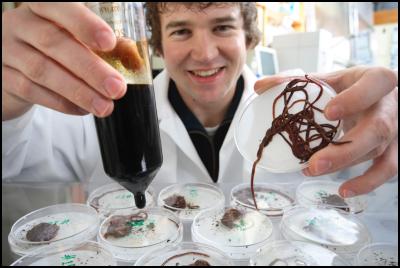Worms Turn On Pulp Mill Waste
For Immediate Release
18 July, 2006
Worms Turn On Pulp Mill Waste

Click for big version
Nick Shannon, a Waikato University student working at Crown Research Institute Scion, is investigating the potential use of worms in a bid to find environmentally-friendly ways of processing pulp mill waste.
Scion researchers in Rotorua
are turning to worms in a bid to find
environmentally-friendly ways of processing pulp mill
waste.
Waikato University student Nick Shannon has chosen the research project for his MSc thesis, and is working at Crown Research Institute Scion to bring the idea to life.
"Certain wastes from the pulping process contain resin acids that are a natural wood protectant. Pulp mills currently deal with this residue by disposing of it in landfills.
"My project is exploring a new way of accelerating the breakdown of resin acids in these landfills and potentially converting the waste into useful soil," Nick explains.
A study by Landcare scientists confirmed that worms can effectively reduce the levels of resin acids present in pulp mill waste, and Nick's goal is to figure out how the worms do it.
"We're not sure whether worms help the breakdown by aerating the soil, whether there is some kind of organism in their gut that does the job, or if they just accumulate the chemical in their tissue," Nick says.
These are the types of questions that his thesis aims to answer, with a view to promoting sustainable treatment process for the industry.
"This is a very simple idea that is worth exploring, because simple solutions are often the best," he says.
Composting worms are commonly used in many parts of the world to breakdown organic materials ranging from textiles to municipal wastes.
"Once we know more about how the worms work in pulp residue, it gives us the opportunity to look for improvements in how we can use them in an industrial situation."
Coming from a farming background in the Tirau area, Nick has a deep-seated interest in the soil and environmental protection.
His interest in applied science led him to complete a BSc (Tech) at the University of Waikato, and he is completing his MSc while based at Scion in Rotorua.
Nick will soon be taking delivery of a worm shipment, cultivated by Landcare in Christchurch, which he will use in a lab-scale experiment before conducting field trials.
"I never imagined that I would get into worm farming, but there's no telling where an interest in science will lead you," he laughs.
Nick is undertaking the work for Scion's Eco-Smart Technologies group who focus on treating or enhancing waste streams for economic benefit, while providing economic gains.
-ends-


 Vegetables New Zealand: Asparagus Season In Full Flight: Get It While You Still Can
Vegetables New Zealand: Asparagus Season In Full Flight: Get It While You Still Can  Bill Bennett: Download Weekly - How would NZ telecoms cope with another cyclone
Bill Bennett: Download Weekly - How would NZ telecoms cope with another cyclone NZ On Air: Firm Audience Favourites Lead NZ On Air Non-Fiction Funding
NZ On Air: Firm Audience Favourites Lead NZ On Air Non-Fiction Funding Insurance and Financial Services Ombudsman: Woman Gets $40k More After Disputing Insurer’s Decision
Insurance and Financial Services Ombudsman: Woman Gets $40k More After Disputing Insurer’s Decision BNZ: A Quarter Of Older NZers Fear Going Online Due To Scam Concerns
BNZ: A Quarter Of Older NZers Fear Going Online Due To Scam Concerns University of Auckland: Scientists Develop Tool To Monitor Coastal Erosion In Fine Detail
University of Auckland: Scientists Develop Tool To Monitor Coastal Erosion In Fine Detail



